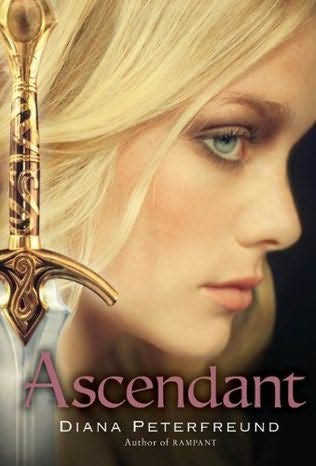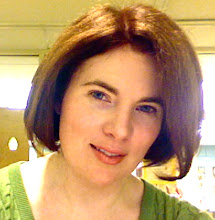Author Rave: Diana Peterfreund
One of my favorite things to do is to read well-done short story collections and find new authors to explore. So when a well-read and especially intelligent student recommended Zombies vs. Unicorns, edited by Holly Black and Justine Larbalestier and featuring stories by heavy hitters like Libba Bray, Cassandra Clare, and Scott Westerfeld (all authors I believe walk around with halos and choral groups singing their praises), I hadn't got to the third story before I ordered the book for my library. (Note to other librarians: Wrapping this book is a royal pain in the unicorn keister, but it's worth it. Really, publisher? Really? I bet it seemed cool in the meeting, but partial covers make librarians crazy. If you ever get some librarian going postal with an AK-47 in your office, and I hope it never happens, "creative cover design" is going to be the reason.)When I got to the story by Diana Peterfreund, I paid extra close attention. I had subscribed to her blog sometime last year, simply because I was impressed by how well she wrote about her writing process, but I shamefully had put her on the back burner when it came to reading any of her books. I was intrigued by the world she painted in her short story, "The Care and Feeding of Your Baby Killer Unicorn" in which a survivor of a unicorn attack actually rescues a newborn unicorn from a freak show and hides it in the woods behind her home, learning to communicate with it and teaching it to not attack humans. In Peterfreund's world, unicorns were once thought extinct, but instead had merely been in hiding from humans who had hunted them to near extinction. And how does one hunt highly magical and sometimes stunningly beautiful, powerful creatures? In a delightful twist (attention, classical history buffs), unicorn hunters are all young women descended from Alexander the Great whose famous white horse, Bucephalus, was, you guessed it, a unicorn. The short story focuses more on the female protagonist, Wen, whose parents are strong Christians and feel her affinity with the species is indicative of some type of "evil." Oh, silly parents.
After such a great short story, I was primed to finally take Rampant off my fiction shelves and bring it home (and I grabbed the sequel, which had just appeared in Barnes & Noble, processing it with the speed of light). I immediately loved the main character, Astrid. First of all, the name, obviously - Astrid bespeaks nordic power and has a distinctly kick-ass quality necessary for a unicorn hunter. She also generates sympathy from the get-go. Astrid's mother is a woman obsessed with the existence of unicorns and geneaology, whose various hobbies negate her ability to parent Astrid or hold down any kind of lucrative job. Astrid's life consists of living with her eccentric mother over her uncle' garage and limiting social engagements involving her mother lest the u-word crops up and ruins her reputation. A botched babysitting job ends up with watching her pushy (hanky-panky kind of pushy) boyfriend get gored by a unicorn, much to her surprise as Astrid had never believed in their existence. Her mother comes to her rescue using a family "remedy" to save her boyfriend's life, but rather than express concern over the near-fatal attack, her mother is ecstatic. Astrid has managed to attract a unicorn (unicorn hunter requirement #1), not lose her virginity to her pushy boyfriend (requirement #2), and now the mother has discovered online that an ancient convent of unicorn hunters is reopening in Rome (yes, in Italy) and the ticket is bought so Astrid can go live there and be trained. Funded by Gordian Pharmaceuticals who claim to want to understand the potential of the unicorn's healing powers, the girls' lives become increasingly at risk by both expected threats like the unicorns and ones they could not have anticipated.
Unwanted at home, Astrid ships off, quickly joined by her older cousin, Phil, who is appalled at her aunt's behavior and also seems to have the gene (and other requirements) for being a hunter. Other girls join them in the decaying convent, and with potential romantic entanglements, Astrid must hone her prodigious skill in hunting while reconciling her conflicted emotions about killing creatures that may deserve to live. Rampant's sequel, Ascendent, takes off right where the first book leaves off, and develops that internal conflict further. (BTW, Wen from the short story comes into this book with her little trained unicorn in tow, a nice touch.) More history of the unicorns and their hunters is revealed, helping Astrid understand how complicated her legacy truly is.
Astrid takes a job with the pharmaceutical company funding the "convent" as a unicorn wrangler for their resident herd, and ends up discovering more about the species than makes her comfortable. With additional layers revealed about whose interests are really being served by her work and their work of her fellow hunters, Astrid must face grave consequences if her choices do not conform to the expectations of the adults around her. Check out what Peterfreund has to say about the series:
Diana Peterfreund's personal biography is a diverse and interesting one, indicating a variety of jobs held after obtaining an Ivy League education. Along those lines, I'm interested to also try her well-received series for adults, started off with Secret Society Girl: An Ivy League Novel focusing on a college junior inducted into an exclusive secret society (what else?). I'm not sure that it will have quite the unique spin as this fantasy fiction series, but if it's half as well-written, I'm going to enjoy it!



































